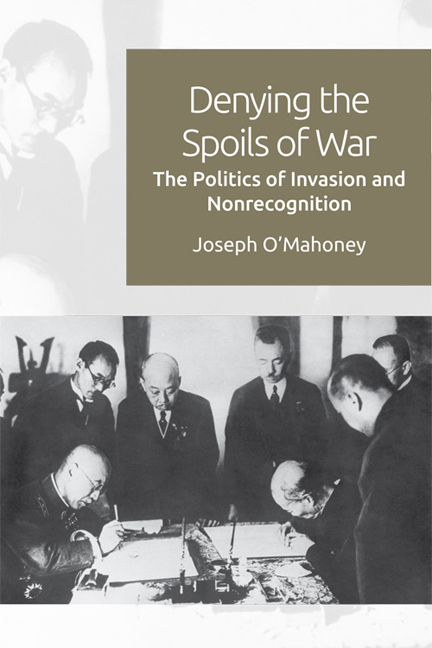Book contents
- Frontmatter
- Contents
- List of Figures and Tables
- Acknowledgements
- List of Acronyms and Abbreviations
- Introduction
- 1 Rule Maintenance: the Logic of Symbolic Sanctions
- 2 The Manchurian Crisis
- 3 The Abyssinian Crisis
- 4 Turkey, Cyprus and the Turkish Republic of Northern Cyprus
- 5 The Independence of Bangladesh
- 6 The Uncertain Fruits of Victory: Variation in Nonrecognition
- Conclusion
- Bibliography
- Index
2 - The Manchurian Crisis
- Frontmatter
- Contents
- List of Figures and Tables
- Acknowledgements
- List of Acronyms and Abbreviations
- Introduction
- 1 Rule Maintenance: the Logic of Symbolic Sanctions
- 2 The Manchurian Crisis
- 3 The Abyssinian Crisis
- 4 Turkey, Cyprus and the Turkish Republic of Northern Cyprus
- 5 The Independence of Bangladesh
- 6 The Uncertain Fruits of Victory: Variation in Nonrecognition
- Conclusion
- Bibliography
- Index
Summary
INTRODUTION
The Manchurian Crisis was a major international diplomatic incident arising from Japan's use of force in Manchuria in Northern China over the period 1931–3. It was the setting for the first use of nonrecognition as a sanction against the illegitimate use of force. In the previous chapter, I outlined various types of reasoning underlying the imposition of sanctions. I focused on rule maintenance, the idea that symbolic sanctions create common knowledge of the rules by which states feel the international system should be governed. This chapter analyses the Manchurian Crisis in order to answer the question of why nonrecognition was adopted as a sanction against aggression in this case. Numerous commentaries identify the Manchurian Crisis as a seminal event in the development of the rule of nonrecognition and the laws of war. For example, Langer asserts that events during the crisis were ‘epochmaking’ (1947: 285). As it was the first instance of the nonrecognition of aggressive gain, the actors in the crisis had no prima facie expectation that nonrecognition was a viable policy option, let alone the default or expected reaction. This has two implications for the ensuing analysis. First, the reasoning behind the policy of nonrecognition is likely to be more explicit and more clearly laid out. When a policy is enacted for the first time, actors often need to spell out why it is worth doing, both for themselves and when persuading or legitimating the policy to others. This is a benefit if we are trying to understand the motivations behind a policy. However, the second implication is that the process by which the nonrecognition policy is decided upon is indirect, convoluted and messier than after it became a regular occurrence. There is a long, drawn-out process whereby people come to see a particular reason for a policy as persuasive and determinative. This means that there are changes over the course of the crisis, while various reasons are considered, offered and evaluated. That said, by the denouement of the crisis, the dominant reason why nonrecognition was enacted in the Manchurian Crisis was rule maintenance. The US and the League of Nations said that they refused to recognise the outcome of Japan's use of force because they wanted to maintain the illegitimacy of aggression.
- Type
- Chapter
- Information
- Denying the Spoils of WarThe Politics of Invasion and Nonrecognition, pp. 33 - 73Publisher: Edinburgh University PressPrint publication year: 2018



